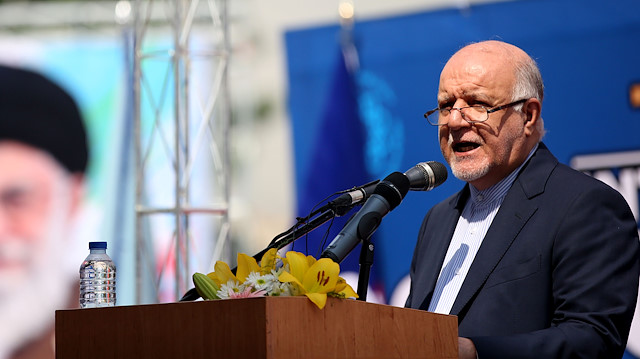
Petroleum Minister Zangeneh points to US sanctions and criticizes Washington official
OPEC member Iran is looking for an exemption to the cartel's oil cuts due to U.S. sanctions, Iranian Minister of Petroleum said Thursday.
“As I have said earlier, at this stage and as long as the sanctions continue, Iran does not participate in any agreement on OPEC production, and must be excluded from any decision on the level of production," Bijan Zangeneh told reporters in Vienna, according to Iran's Shana agency.
“Iran has always supported OPEC and its positions for market stability, but at this point, as I said earlier, as long as Iran is faced with sanctions, it will not participate in any agreements on production,” he added.
However, he did not provide any information on how much crude oil Iran produces, saying “This would lead to more U.S. pressure on Iran," according to Shana.
Iran is estimated to have produced 3.3 million barrels per day (mbpd) of crude oil in October, according to OPEC's Monthly Oil Market report for November.
Zangeneh's request also came after Saudi Energy Minister Khalid al-Falih met with Brian Hook, the senior policy adviser to the U.S. Secretary of State and special representative for Iran.
The officials are believed to have discussed how U.S. sanctions on Iran would affect the market, and the ways Saudi Arabia would adjust its production level in the absence of Iranian output since U.S. President Donald Trump wants low oil prices.
Zangeneh criticized the meeting between the two officials.
"If Mr. Hook has come to Vienna to apply for U.S. membership in OPEC and therefore meets OPEC members, this request can be reviewed, but if he wants to push for more pressure on Iran through OPEC, it is an unprofessional move," he said, according to Shana.
"OPEC is an independent organization and no part of the U.S. Department of Energy to take orders from Washington," he asserted.
Zangeneh added that $60 to $70 per barrel would be a reasonable price range for crude oil.
OPEC members have convened in Vienna to begin their two-day discussions between members and non-OPEC oil producing countries to balance the global oil market and raise oil prices.
Oil prices climbed to as high as $86 a barrel on Oct. 3 as the U.S. was set to reimpose sanctions on Iranian crude exports beginning from Nov. 5, raising worries that this would take significant output from the global oil market.
However, Washington later provided waivers to eight countries that import Iranian crude, including China, India and Turkey, for 90 days. While waivers calmed the markets, rising crude oil production in the U.S., Russia and Saudi Arabia pushed prices lower.
International benchmark Brent crude declined to $57.50 per barrel on Nov. 29, posting a 33 percent fall from its Oct. 3 high.
Brent crude was trading at $60.46 per barrel with a 1.9 percent loss at 0915 GMT on Thursday.



